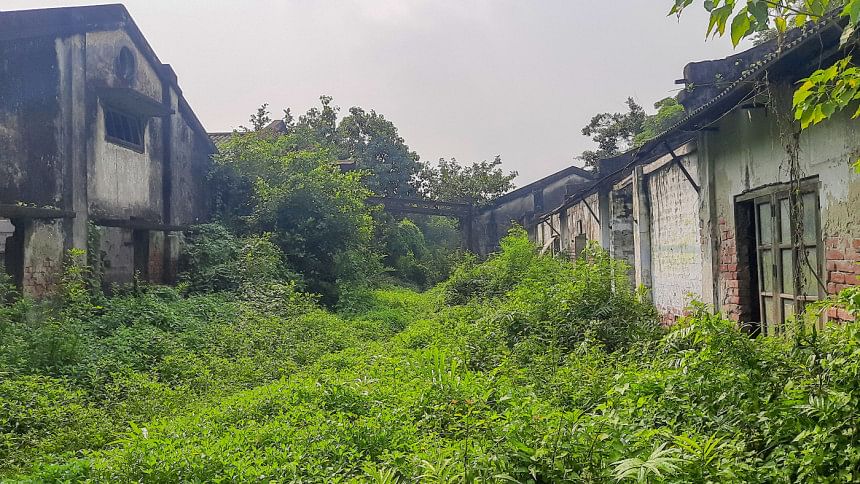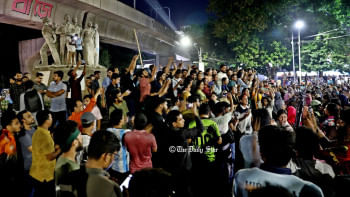Dada Match factory fading away amid lack of initiatives for reopening

The once renowned state-run Dada Match factory in Khulna city may soon fade away from people's memory as no effective measures have been taken to reopen it in the past 14 years.
About 1,950 workers lost jobs when Bhaiya Group, which operated the factory on lease, decided to shutter the unit citing huge losses on August 18, 2010.
Most of the workers were terminated without pay and migrated elsewhere for employment while much of the machinery and equipment have been damaged or stolen for being left unprotected.
As such, many continue to struggle and hope the factory will reopen someday.
"I spent 20 of my best years here before being suddenly terminated without any cause," said Taiyab Kha, a former worker who still lives near the unit.
Having lost his income, Kha was compelled to send his family back to their village.
"I cannot explain my agony. Many a time, I tried and failed to get my dues. Now, I grow vegetables on the factory's abandoned land and sell it. Sometimes, I drive a rickshaw or work as a day labourer," he added.
HM Shahadat Hossain, general secretary of the Dada Match Workers' Union, said despite the assurance of Prime Minister Sheikh Hasina, local lawmakers, workers' bodies and government agencies have failed to help revive the factory.
"We have contacted many agencies to convince them that this factory is a viable project. We urged the government to take steps to resume its operation without any further delay."
Hossain also said the factory was closed down due to a dispute between Bhaiya Group and the government but did not go into the details.
However, he did say the company started taking loans continuously after leasing the factory but could not run the unit.
Rahamat Mia, another former worker who lives near the factory, said they were initially told the factory would reopen within three months of its closure.
"I worked at the factory for almost 10 years and my father worked there before me. There was never a loss before the government handed it over to the private sector."
During a recent visit to the factory, it was found that abandoned goods were lying in several of its warehouses while some workers and their families were present at its labour colony.
The factory grounds were covered in overgrowth and the remaining machinery had turned to scrap. Additionally, not a single security guard was in sight.
As a result, influential locals can openly loot the factory, said Nurul Haque, in-charge of factory maintenance on behalf of Bhaiya Group.
"More than 500 motors, 200 manual cranks, 500 fans and other machinery have already been stolen."
Haque also said they have made complaints regarding the issue to various departments, including the local police and the district administration. "But still we did not get any remedy."
The factory began production in 1955 on 17.79 acres of land in the Rupsha area of Khulna city. The main raw material used for producing the matches was Gewa timber from the Sundarbans.
Initially, the factory could produce around 12,500 matchboxes each day.
The government had nationalised the factory in 1973 and after Hussain Muhammad Ershad seized power in 1982, the de-nationalisation policy was introduced.
Dhaka Match Industries Company Limited was formed under that policy in 1984, with the government offloading 60 percent of its shares to a Swedish company and 10 percent to a Swedish fund. It kept the remaining 30 percent.
Dhaka Match Industries Company Limited was the holding company of the Dhaka Match factory as well as Dada Match factory. In 1989, the Swedish company sold its shares to Bhaiya Group.
Dhaka Match factory was closed in 2005 and Dada Match factory was shut in 2010.
On March 5, 2011, Prime Minister Sheikh Hasina held a public meeting in Khulna city, where she announced the Dada Match factory would be revived under the Bangladesh Chemical Industries Corporation (BCIC).
On March 23 that year, the deputy commissioner of Khulna took over the factory on the instructions of the industries ministry.
According to the deputy commissioner's office, there was a security arrangement made up of local police and ansar members. But when the coronavirus pandemic broke out in 2020, the security was evacuated and the factory has since been left unprotected.
Khandaker Yasir Arefin, the deputy commissioner of Khulna, said BCIC is now responsible for taking any decision regarding the reopening of the factory.

 For all latest news, follow The Daily Star's Google News channel.
For all latest news, follow The Daily Star's Google News channel. 



Comments